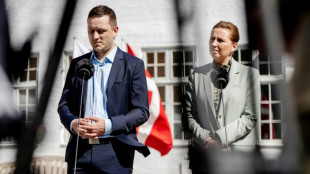
UK net migration in 2024 fell by half to 431,000

Net migration to the UK dropped by half in 2024, the latest official figures showed on Thursday, in what will be a welcome boost for under-fire Prime Minister Keir Starmer.
The Office for National Statistics (ONS) estimated the figure for last year stood at 431,000, a dramatic drop from the 860,000 recorded in the year to December 2023.
It was the biggest fall in net migration since the Covid pandemic.
"Long-term net migration is down by almost 50 percent," the ONS said in its latest report.
"We are seeing reductions in people arriving on work- and study-related visas," it added.
It had also recorded "an increase in emigration over the 12 months to December 2024", especially by those on work and study visas.
The previous Conservative government had toughed the rules for people applying for such visas, setting higher caps on salaries and refusing permission for people to bring their families with them.
Migration has become a hot-button issue in UK politics and Starmer unveiled tough new policies on May 12 vowing to "finally take back control" of Britain's borders.
The measures included cutting overseas care workers, doubling the length of time before migrants can qualify for settlement and new powers to deport foreign criminals.
Starmer, a former human rights lawyer who voted for the UK to remain part of the European Union, is under renewed pressure to tackle immigration following surprise gains by the anti-immigration Reform UK party in May local elections.
He said in his speech that Britain risked becoming "an island of strangers", triggering sharp criticism from within his own Labour party for his toughened rhetoric.
- 'Welcome drop' -
The aim of the new measures is to "reduce net migration substantially, with visa numbers falling by up to 100,000 a year by the end of this parliament" in 2029, the interior ministry said in a statement.
Interior minister Yvette Cooper said: "The 300,000 drop in net migration since the election is important and welcome after the figures quadrupled to nearly a million in the last parliament."
She added that nearly 30,000 unsuccessful asylum seekers, many arriving on UK shores in small boats, had been returned to their countries of origin since the general election in July.
It marked a 12-period increase compared to the same period 12 months ago.
But opposition Conservative leader Kemi Badenoch argued on X: "Numbers are still too high and Starmer STILL keeps voting against every plan to bring them down further."
She alleged that as soon as Labour took power after winning the July election they had scrapped "the tough measures we took to get these numbers down".
Conservative former home secretary James Cleverly said while Labour "will try to claim credit", the changes were a result of policies enacted by his government.
"This drop is because of the visa rule changes that I put in place," he argued on X.
According to the latest poll of voting intentions by YouGov, the Reform party of hardliner Nigel Farage is ahead in the polls, with 29 percent support, compared to 22 percent for Labour.
Meanwhile, the Liberal Democrats edged ahead of the Conservatives with 17 percent, who were relegated to fourth place on 16 percent.
G.Durand--PS

 London
London

 Manchester
Manchester
 Glasgow
Glasgow
 Dublin
Dublin
 Belfast
Belfast
 Washington
Washington
 Denver
Denver
 Atlanta
Atlanta
 Dallas
Dallas
 Houston Texas
Houston Texas
 New Orleans
New Orleans
 El Paso
El Paso
 Phoenix
Phoenix
 Los Angeles
Los Angeles



